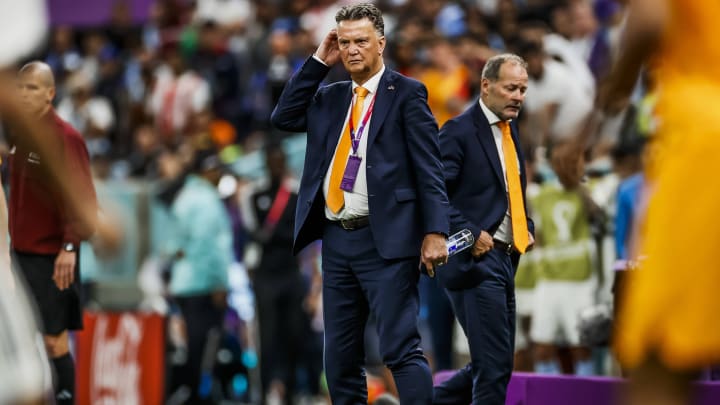Netherlands’ World Cup Ends Again in PK Heartbreak Despite van Gaal’s Evolution

LUSAIL, Qatar — Louis van Gaal being Louis van Gaal, this may not be the end; he has already expressed interest in succeeding Roberto Martínez with Belgium. But defeat in a penalty shootout against Argentina after a furious rally salvaged a 2–2 draw and, for at least 30 additional minutes, the Dutch's World Cup, is the end for him with the Netherlands. He took the job—for the third time—after the Euros, replacing Frank De Boer, and has gone unbeaten since, rescuing a listing World Cup qualifying campaign and making it look, briefly, as though the Dutch, even with a very average squad, might win the World Cup.
Van Gaal is 71 now, and has undergone treatment for cancer this year. He seems more relaxed, less brusque than he once was, but what is most remarkable about him is how this most dogmatic of coaches has not doubled down on his beliefs as he has aged, but embraced a new way of playing. The 4-3-3 that was once non-negotiable has yielded to other shapes, the obsession with possession been replaced by a willingness to go direct.
“If you don’t have the players, you can’t play with wingers,” he explained. “If you want to keep the pitch large and wide you need wingers. I solved that problem by playing a different kind of game.
“In the first half it was same old problem: When we had ball possession we couldn’t find free bodies. I tried to solve that by fielding Teun Koopmeiners and Steven Berghuis, first with 3-4-3 and later on with 4-1-4-1 and 4-4-2. And then Argentina needed to adjust and adapt.”
In the 2014 World Cup semifinal against Argentina, Van Gaal had deployed Nigel de Jong to man-mark Messi. It worked, Messi was negated and, after a goalless draw, the Netherlands was eliminated only on penalties. This time, despite talk Jurrien Timber might be given a similar task, there was no direct man-marking. In the 11 v 11 practice on Thursday, he had Noa Lang of Club Brugge pretend to be Messi—“he also thought this was logical,” as Van Gaal put it—but replicating Messi is almost impossibly difficult, not just in his ability but in his inactivity. To set a player to man-mark him is to take a player out of the game to thwart somebody who spends a large portion of the game wandering away from it.
For 80 minutes, it seemed that Messi had won it. It was his run and brilliant reverse pass that teed up the first for Nahuel Molina, his penalty that put Argentina 2–0 up. On two other occasions, Messi had threatened to open the Netherlands up, only for heavy passes from teammates to curtail the moves. It seemed, yet again, like Messi’s day and as though all the analysis of the Netherlands would focus on Van Gaal’s failure to stop him.
Van Gaal had thrown on Luuk De Jong after 64 minutes. For all their reputation for neat intricate football, the Dutch have always had room for a big No. 9: It was, after all, 6-foot-3 Dirk Nanninga who got the equalizer against Argentina in the 1978 World Cup final. But the obvious problem seemed to be that the Dutch used to specialize in wingers and this is a side without any. De Jong’s introduction meant a move to four at the back, so there weren’t even wingbacks to get the ball into the area. With 12 minutes remaining, Van Gaal added another big No. 9 in Wout Weghorst.
It was totally against the principles of Total Football, opposed to the philosophy Van Gaal used to espouse before his conversion, a decade or so ago, to pragmatism. But it worked. With seven minutes to go, Berghuis crossed and Weghorst scored with a powerful header. Virgil van Dijk had been pushed up front to form a very unDutch front three, almost as though Van Gaal were deliberately subverting expectations.
Argentina had three center backs. Argentinian center backs love heading the ball clear. It was all gloriously counterintuitive. The clock hit 90 minutes, but there were 10 minutes of injury time. It was a couple of minutes beyond that when Argentina needlessly conceded a free kick on the edge of the box. A shot, surely? Or maybe a floated cross to Nathan Aké, hovering with intent at the back post? No, Koopmeiners rolled a pass to Weghorst on the edge of the wall and he turned to stroke in his finish, a free-kick the striker developed at Besiktas and brought to the Dutch side. At the end of an aerial bombardment, it was a moment of surprising deftness from a 6'6" striker that leveled it.
Van Gaal, somehow, had turned it around. But even he, it turns out, has not worked out a way to make the Dutch good at penalty shootouts. Van Gaal has still not lost a competitive game with the Netherlands since a defeat to Ireland in 2001, but as in ’14, a stint as national manager was ended by Argentinian penalties. “I’ve had a wonderful time,” Van Gaal said, of this spell in charge, “but it’s incredibly painful to see how we’ve been eliminated.”

An accomplished author of multiple books, Jonathan Wilson is one of the world’s preeminent minds on soccer tactics and history.